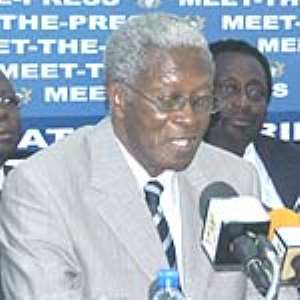
Professor Daniel Adzei Bekoe, Chairman of the Ghana Atomic Energy Commission (GAEC), yesterday said the possibility for Ghana to have a nuclear power plant to complement its current energy needs was high.
“If a decision is taken now to add a nuclear power plant to our sources of electricity, it will take at least eight years to deliver the first nuclear,” he said at a press conference in Accra on Nuclear Power and the current energy crises.
He said the establishment of a nuclear power plant was a sophisticated technology which required a corresponding sophisticated infrastructure and so would only serve as a long term purpose and not one for short term solutions.
Prof Bekoe who is also the Chairman of the Council of State said from experience it was necessary to develop effective national policies and legislations before the project is undertaken, so that among other objectives, the safety of operators, the environment and the general population was assured and that they were protected from radiation.
He said with the existing infrastructure at the GAEC, expansion work could take a maximum of two years in matters relating to safety, security, legal and regulatory framework with “the rest of the planning and implementation taking another five to six years.”
Prof Bekoe said if the decision to build the Nuclear Power station was agreed upon by government, the issue of location would have to be seriously considered before the project took off, taking into consideration the encroachment of the GAEC lands.
He said the generation of nuclear power was however environmentally friendly compared to hydro and thermal, except that it had high capital cost, though it produced electricity at a cost lesser than that from oil-fired stations.
Talking about environmental friendliness, he said dams were noted for their submersion of vast agricultural and mineral-rich lands, the displacement of settlements and the propagation of water-borne disease.
“Thermal generators produce a lot of green house gases which lead to climate change which the whole world is watching with some concern,” he said, adding that, the use of those sources had to be limited although Ghana was nowhere near the league of high generators of green house gases.
Prof Edward H. K. Akaho, Director-General, GAEC said if the country decided to go in for a nuclear plant for the generation of electricity, he would recommend an agreement where the supplier of the raw material took back the waste after its usage to avoid any catastrophes associated with managing nuclear waste.
He said for the past 12 years, Ghana had been operating a small reactor without any incidence, because the end use was always sent back to the manufacturer. He said the management so far, indicated that GAEC had the capacity to manage one for electricity if government decided to go in for it.
Prof Akaho said currently the International Atomic Energy Agency was using a number of personnel from Ghana for its programmes and projects based on the confidence it had in the Ghanaian experts.




 2024 election will be decided on the grounds of the economy; choice of running m...
2024 election will be decided on the grounds of the economy; choice of running m...
 Dumsor: We're demanding less; just give us a timetable — Kwesi Pratt to ECG
Dumsor: We're demanding less; just give us a timetable — Kwesi Pratt to ECG
 Do I have to apologise for doing my security work, I won’t – Simon Osei-Mensah r...
Do I have to apologise for doing my security work, I won’t – Simon Osei-Mensah r...
 Prestea and Bogoso mines: Complete payment of outstanding salaries not later tha...
Prestea and Bogoso mines: Complete payment of outstanding salaries not later tha...
 NDC postpones Prof. Opoku-Agyemang entry tour to May
NDC postpones Prof. Opoku-Agyemang entry tour to May
 All my businesses have collapsed under Akufo-Addo — NDC Central regional chair
All my businesses have collapsed under Akufo-Addo — NDC Central regional chair
 Military, Prison Officers clash in Bawku, three injured
Military, Prison Officers clash in Bawku, three injured
 GRA-SML contract: MFWA files RTI request demanding KPMG report
GRA-SML contract: MFWA files RTI request demanding KPMG report
 Court threatens to call second accused to testify if NDC's Ofosu Ampofo fails to...
Court threatens to call second accused to testify if NDC's Ofosu Ampofo fails to...
 Family accuses hospital of medical negligence, extortion in death of 17-year-old...
Family accuses hospital of medical negligence, extortion in death of 17-year-old...
